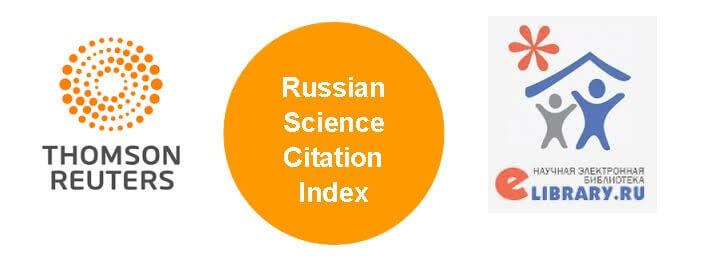Formation of plasmon-exciton nanostructures based on quantum dots and metal nanoparticles with a nonlinear optical response
Abstract
The establishment of the conditions for the formation of nanostructures with plasmon-exciton interaction based onquantum dots and plasmonic nanoparticles that provide unique nonlinear optical properties is an urgent task. The study demonstrates the formation of plasmon-exciton nanostructures based on hydrophilic colloidal Zn0.5Cd0.5S, Ag2S quantum dots and metal nanoparticles.
Transmission electron microscopy and optical absorption and luminescence spectroscopy were used to substantiate the formation of plasmon-exciton hybrid nanostructures. The phase composition of the studied samples was determined by X-ray diffraction. The results obtained using ARLX’TRA diffractometer (Switzerland) indicated a cubic crystal structure (F43m) of synthesised Zn0.5Cd0.5S quantum dots and monoclinic (P21/C) crystal lattice of Ag2S. Transmission electron microscopy revealed that plasmonic nanoparticles are adsorption centres for quantum dots. The average sizes of the studied samples were determined: colloidal Ag2S quantum dots (2.6 nm), Zn0.5Cd0.5S(2.0 nm) and metal nanoparticles: silver
nanospheres (10 nm) and gold nanorods (4x25 nm). The transformation of the extinction spectra of the light and the luminescence quenching of quantum dots have been established in mixtures of quantum dots and plasmonic nanoparticles.
The nonlinear optical parameters of the studied samples were determined using the Z-scanning method at wavelengths of 355 and 532 nm in the field of nanosecond laser pulses. The conditions for the formation of hybrid nanostructures that provide an increase of the coefficient of nonlinear absorption of laser pulses (355 and 532 nm) up to 9 times with a duration of 10 ns due to the reverse saturable absorption occurring due to cascade two-quantum transitions in the intrinsic and local states of colloidal quantum dots and the suppression of nonlinear refraction, were determined.
The observed changes were explained by the manifestation of the Purcell effect on the states of quantum dots in the presence of nanoresonators (gold nanorods and silver nanospheres). The results of these studies create new opportunities for the development of original systems for controlling the intensity of laser radiation, as well as quantum sensors of a new generation
Downloads
References
Cao E., Lin W., Sun M., Liang W., Song Yi. Exciton-plasmon coupling interactions: from principle to applications. Nanophotonics. 2018;7(1): 145–167. https://doi.org/10.1515/nanoph-2017-0059
Ke L., Katsnelson M. I. Electron correlation effects on exchange interactions and spin excitations in 2D van der Waals materials. npj Computational Materials. 2021;7(4): 1–8. https://doi.org/10.1038/s41524-020-00469-2
De Vera P., Abril I., Garcia-Molina R. Excitation and ionisation cross-sections in condensed-phase biomaterials by electrons down to very low energy: application to liquid water and genetic building blocks. Physical Chemistry Chemical Physics. 2021;23: 5079–5095. https://doi.org/10.1039/d0cp04951d
Yadav R. K., Aneesh J., Sharma R., … Adarsh K. V. Designing hybrids of graphene oxide and gold nanoparticles for nonlinear optical response. Physical Revied Applied. 2008;9(4): 044043(10). https://doi.org/10.1103/PhysRevApplied.9.044043
Davoodi F., Talebi N. Plasmon-exciton interactions in nanometer-thick gold-WSe2 multilayer structures: implications for photodetectors, sensors, and light-emitting devices. ACS Applied Nano Materials. 2021;4(6): 6067–6074. https://doi.org/10.1021/acsanm.1c00889
Kholmicheva N., Royo Romero L., Cassidy J., Zamkov M. Prospects and applications of plasmon-exciton nteractions in the near-field regime. Nanophotonics. 2019;8(4): 613–628. https://doi.org/10.1515/nanoph-2018-0143
Hu S., Ren Y., Wang Y., … Tang Y. Surface plasmon resonance enhancement of photoluminescence intensity and
bioimaging application of gold nanorod@CdSe/ZnS quantum dots. Beilstein Journal of Nanotechnology, 2019;10: 22–31. https://doi.org/10.3762/bjnano.10.3
Danilov V. V., Panfutova A. S., Khrebtov A. I., Ambrosini S., Videnichev D. A. Optical limiting as result a of photoinduced electron transfer in hybrid systems with CdSe/ZnS quantum dots, C60, and Perylene. Optics Letters. 2012;37(19): 3948–3950. https://doi.org/10.1364/OL.37.003948
Zvyagin A. I., Perepelitsa A. S., Ovchinnikov O. V., Smirnov M. S., Ganeev R. A. Nonlinear optical properties of associates of erythrosine molecules and gold nanoparticles. Materials Research Express. 2019;6: 1150c8. https://doi.org/10.1088/2053-1591/ab4e2a
Ovchinnikov O. V., Smirnov M. S., Chevychelova T. A., Zvyagin A. I., Selyukov A. S. Nonlinear absorption enhancement of Methylene Blue in the presence of Au/SiO2 core/shell nanoparticles. Dyes and Pigments. 2022;197: 109829. https://doi.org/10.1016/j.dyepig.2021.109829
Jana N. R., Gearheart L., Murphy C. J. Seedmediated growtha for shape-controlled synthesis of spheroidal and rod-like gold nanoparticles using a surfactant template. Advanced Materials. 2001;13(18): 1389–1393. https://doi.org/10.1002/1521-4095(200109)13:18<1389::aid-adma1389>3.0.co;2-f
Frank A. J., Cathcart N., Maly K. E., Kitaev V. Synthesis of silver nanoprisms with variable size and investigation of their optical properties: a first-year undergraduate experiment exploring plasmonic nanoparticles. Journal of Chemical Education, 2010;87(10): 1098–1101. https://doi.org/10.1021/ed100166g
Sheik-Bahae M., Hutchings D. C., Hagan D. J., Van Stryland E. W. Dispersion of bound electron nonlinear refraction in solids. IEEE Journal of Quantum Electronics. 1991;27: 1296-1309, https://doi.org/10.1109/3.89946
Amendola V., Pilot R., Frasconi M., Marago O. M, Iati M. A. Surface plasmon resonance in gold nanoparticles: a review. Journal of Physics: Condensed Mat ter. 2017; 29: 203002 (48). https://doi.org/10.1088/1361-648X/aa60f3
Grevtseva I. G. , Chev ychelova T. A. , Derepko V. N., Ovchinnikov O. V., Smirnov M. S., Perepelitsa A. S., Parshina A. S. Spectral manifestations of the exciton-plasmon interaction of Ag2S quantum dots with silver and gold nanoparticles. Condensed Matter and Interphases. 2021;23(1): 25–31. https://doi.org/10.17308/kcmf.2021.23/3294
Daniel M. C., Astruc D. Gold nanoparticles: assembly, supramolecular chemistry, quantum-sizerelated properties, and applications toward biology, catalysis, and nanotechnology. Chemical Reviews. 2004;104(1): 293–346. https://doi.org/10.1021/cr030698+
Durach M., Rusina A., Stockman M. I., Nelson K. Toward full spatiotemporal control on the nanoscale. Nano Letters. 2007;7(10): 3145–3149. https://doi.org/10.1021/nl071718g
Komarala V. K., Rakovich Yu. P., Bradley A. L. Off-resonance surface plasmon enhanced spontaneous emission from CdTe quantum dots. Applied Physics Letters. 2006; 89(25): 253118. https://doi.org/10.1063/1.2422906
Gong H. M., Wang X. H., Du Y. M., Wang Q. Q. Optical nonlinear absorption and refraction of CdS and CdS-Ag core-shell quantum dots. The Journal of Chemical Physics. 2006;125(2): 024707. https://doi.org/10.1063/1.2212400
Ovchinnikov O. V., Smirnov M. S., Grevtseva I. G., … Kondratenko T. S. Luminescent properties of colloidal mixtures of Zn0.5Cd0.5S quantum dots and gold nanoparticles. Condensed Matter and Interphases. 2021;23(1): 49–55. https://doi.org/10.17308/kcmf.2021.23/3302
Ganeev R. A., Ryasnyansky A. I., Tugushev R. I., Usmanov T. Investigation of nonlinear refraction and nonlinear absorption of semiconductor nanoparticle solutions prepared by laser ablation. Journal of Optics A: Pure and Applied Optics 2003;5(4): 409–417. https://doi.org/10.1088/1464-4258/5/4/317
Chang Q., Gao Y., Liu X., Chang C. Nonlinear properties of water-soluble Ag2S and PbS quantum dots under picosecond laser pulses. IOP Conference Series: Earth and Environmental Science. 2018;186(4): 012076. https://doi.org/10.1088/1755-1315/186/4/012076
Kondratenko T. S., Zvyagin A. I., Smirnov M. S., Grevtseva I. G., Perepelitsa A. S., Ovchinnikov O. V. Luminescence and nonlinear optical properties of colloidal Ag2S quantum dots. Journal of Luminescence. 2019;208: 193–200. https://doi.org/10.1016/j.jlumin.2018.12.042
Zvyagin A. I., Chevychelova T. A., Chirkov K. S., Smirnov M. S., Ovchinnikov O. V. Nonlinear optical properties of colloidal PbS and Ag2S quantum dots passivated with 2-mercaptopropionic acid. Bulletin of the Russian Academy of Sciences: Physics. 2022;86: 1183–1187. https://doi.org/10.3103/S1062873822100264
Smirnov M. S., Ovchinnikov O. V., Zvyagin A. I., … Pham H. M. Transient absorption dynamics and nonlinear optical response in colloidal Ag2S quantum dots. Optics and Spectroscopy. 2022;130(3): 224–231. https://doi.org/10.1134/S0030400X22030146
Chevychelova T. A., Zvyagin A. I., Perepelitsa A. S., Ovchinnikov O. V., Smirnov M. S., Selyukov A. S. Role of photoinduced destruction of gold nanorods in the formation of nonlinear optical response. Optik. 2022;250(2): 168352, https://doi.org/10.1016/j.ijleo.2021.168352
Liu X., Guo S., Wang H., Hou L. Theoretical study on the closed-aperture Z-scan curves in the materials with nonlinear refraction and strong nonlinear absorption. Optics Communications. 2001;197(4-6): 431–437. https://doi.org/10.1016/s0030-4018(01)01406-7
Copyright (c) 2023 Condensed Matter and Interphases

This work is licensed under a Creative Commons Attribution 4.0 International License.













